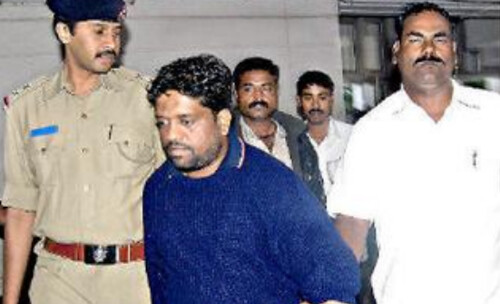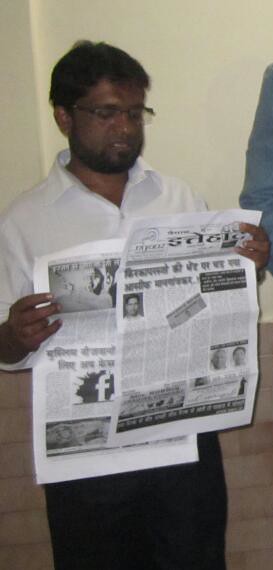If the jails were harsher for Iqbal Ahmed Jakati, life outside after he walked as a free man was not pleasant anymore. Even after getting a clean cheat from the courts, the corrupt system continues to push him to the wall.
By TwoCircles.net Staff Reporter,
Bangalore: If ‘terror persecution’ means destroying families, long incarcerations, negative tagging for life, fading belief from the system, pushing a person to suicide, it all gets embodied in the story of journalist Iqbal Ahmed Jakati, a living example of how irresponsible policing in terror cases can transform one’s life into hell.
A resident of Belgaum, Iqbal has been a continuous target of local police force. Iqbal describe himself as social activist and claims that his community-activism brought him under police radar for all the wrong reasons. He was a prominent columnist for a Marathi daily Tarun Bharati. Moreover, to support his large family, he used to double up as a sales man at Tata Motors automobile showroom.
Chasing a dream of better future, he went to Sharjah in June 2008 but barely a month later, his dreams crashed after receiving a call from his frightened father, a school headmaster. “Who are your associates? Who are you interacting with?” asked the old nervous voice of his father from the other end. When Iqbal enquired the reason for fear, his father informed him that the Anti-Terrorist Cell (ATC) had just left their home ransacked claiming that it was a search operation “to find weapons in the house of a terrorist.”
A perplexed Iqbal, through his father, got in touch with the ATC officer in-charge Mahantesh, who asked him to return to India to answer few questions and then soon he will be free. Believing the officer’s words, Iqbal returned on August 2, 2008 only to be arrested at Mumbai airport. “To my horror, at the Sahara Airport police station, I saw breaking news on every news channel that claimed an absconding LeT operative has been arrested from the airport.”

Iqbal Ahmad Jakati
Thus began the most tragic period of his life. In the span of four days, he was interrogated by the police from four different states. Overnight, he was booked as a prime accused in Hubli blast case and APMC terror conspiracy case. Later, he was also made an accused in saffron flag burning case of 2007 in Belgaum. Soon, police declared him an important member of the banned SIMI, a charge he vehemently denies.
Later, his interrogation went on at different police stations of Karnataka. The most horrific experience was of the narco-analysis test, which painfully impacted his mental health conditions. “I was made to suffer without an iota of proof, I did not commit any crime, police also knew it but they wanted a scapegoat to hush up the investigation, so they found me,” Iqbal said.
“I observed that police officers carried out investigation in an unprofessional manner in an intentional move. During every interrogation, they used to remind me of their impunity. They used to remind me that they are not accountable to anybody and how they can destroy any one’s life at will.”
It took over one year for trial in the cases to begin. Narrating his life in jail, Iqbal illustrated, “For a person accused in a false terror case, a day in jail is equal to a life span of pain. My hope died every day in those dark, small rooms. A grave crime was committed against me, which no system or society can see. My soul was murdered in those cells.”
After over three years of incarceration, Iqbal was acquitted in all the terror cases booked against him. On November 9, 2011 he walked out as a free man. But, if the jails were harsher for him, the outside were not pleasant anymore.
Back home, he found out he and his family were totally bankrupt and socially boycotted. His family had sold all the belongings for his lawyer’s fee. Neighbors and relatives had broken all the social contacts leaving them isolated. “Condition was so grim, at my local mosque, people were even scared to stand near me during the prayer. With the terror tag haunting me wherever I went, I could not find any job. My former employer, the news daily, declined to publish my articles even if I sent them for free.”

Iqbal taken under police custody
“Even after four years of my release, I still struggle to pay my children’s school fee. My wife and mother often ask me what the future of my kids is … honestly I cannot answer them,” a disheartened Iqbal said.
A journalist to the core that Iqbal is, so although he is struggling to earn a piece of bread, he started his own Hindi weekly Paigam-e-Ittehad (message of unity). “I am in a very bad financial condition but at the same time I really wanted to do something for people incarcerated under false cases in prison. I started this weekly to create awareness in the society regarding their conditions,” Iqbal explained the idea behind his struggling journal.
But his assertion for a change did not go down well with the authorities. “Police are continuously harassing me and on petty issues, keep on calling me to the station. They threaten me to not put my pen against the RSS.”

Iqbal reading his weekly journal
“‘If we can keep you in jail for false cases in the past we can still do it now’ is the regular threat by the police,” he claimed. It was as recently as January 2015 that Iqbal witnessed yet another police threat getting into action. In January, he spent 15 days in jail for writing an editorial in his weekly defending Muslim youths who were arrested on the charges of allegedly shouting pro-Pakistani slogans in Milad un Nabi procession. Iqbal cleared his stand, “They put a case on me for supporting anti-nationals. What I wrote in my editorial was simple: those youths were raising slogans ‘Islam Zindabad’ not ‘Islamabad Zindabad’ as RSS has complained.”
Thanks to the continuous harassment of police that is pushing Iqbal to extreme conditions, he claimed: “I often think of committing suicide, but drop the idea only for the sake of my family.” He believes that even after getting a clean cheat from the courts, the corrupt system continues to push him to the wall.
“With my bitter experience, I can tell for sure, in our country, human rights and rule of law is under police boots. It’s a nightmare for me where I lost the hope of ever waking up, justice is bleak, lost in the darkness of corrupt system,” Iqbal said summing up his feeling.
“I am in the body of a wounded soul, one who can’t fight with this crooked system anymore,” a desperation in his voice to find the lost hope.

